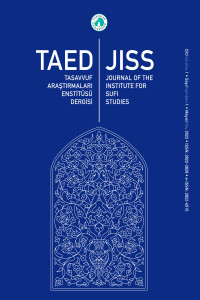Öz
This article aims to reveal the Sulṭān Walad’s practical thought as a spiritual master and administrator of the Mevlevī order, examining his opinion about Iblīs (Satan). Basically, his writings were intended to preserve and transmit the tradition of his father, Jalāl al-Dīn Rūmī, to future generation of the Mevlevī order. A lot of his interpretative works confirm that he puts the highest priority on further comprehension of Rūmī’s thought. Therefore, it is expected that Sulṭān Walad’s works are based on the thoughts of his father Rūmī and his original mind is more or less restrained. However, unexpectedly, his arguments about Iblīs shows clear distinction from his father’s thoughts. This article focuses on their opinions on Iblīs, analyzing their differences on their theory of vice and virtue. From Sulṭān Walad’s attitude toward Iblīs, we could observe that he considered carefully on vice and virtue as a spiritual master and administrator of the Mevlevī order. Not only did Sulṭān Walad inherit his father’s thought, but he tried to reshape his father’s legacy adjusting to the reality of the order.
Anahtar Kelimeler
Sulṭān Walad Jalāl al-Dīn Rūmī Mevlevī order Iblīs Virtue and Vice Sulṭān Walad, Jalāl al-Dīn Rūmī, Mevlevī order, Iblīs, Virtue and Vice
Kaynakça
- Aflākī, Shams al-Dīn Aḥmad. Manāqib al-ʿĀrifīn. 2 vols. Ankara: Türk Tarih Kurumu Basımevi, 1980.
Öz
This article aims to reveal the Sulṭān Walad’s practical thought as a spiritual master and administrator of the Mevlevī order, examining his opinion about Iblīs (Satan). Basically, his writings were intended to preserve and transmit the tradition of his father, Jalāl al-Dīn Rūmī, to future generation of the Mevlevī order. A lot of his interpretative works confirm that he puts the highest priority on further comprehension of Rūmī’s thought. Therefore, it is expected that Sulṭān Walad’s works are based on the thoughts of his father Rūmī and his original mind is more or less restrained. However, unexpectedly, his arguments about Iblīs shows clear distinction from his father’s thoughts. This article focuses on their opinions on Iblīs, analyzing their differences on their theory of vice and virtue. From Sulṭān Walad’s attitude toward Iblīs, we could observe that he considered carefully on vice and virtue as a spiritual master and administrator of the Mevlevī order. Not only did Sulṭān Walad inherit his father’s thought, but he tried to reshape his father’s legacy adjusting to the reality of the order.
Anahtar Kelimeler
Sulṭān Walad Jalāl al-Dīn Rūmī Mevlevī order Iblīs Virtue and Vice Sulṭān Walad, Jalāl al-Dīn Rūmī, Mevlevī order, Iblīs, Virtue and Vice
Kaynakça
- Aflākī, Shams al-Dīn Aḥmad. Manāqib al-ʿĀrifīn. 2 vols. Ankara: Türk Tarih Kurumu Basımevi, 1980.
Ayrıntılar
| Birincil Dil | İngilizce |
|---|---|
| Konular | Din, Toplum ve Kültür Araştırmaları |
| Bölüm | Araştırma Makaleleri |
| Yazarlar | |
| Yayımlanma Tarihi | 3 Ağustos 2022 |
| Yayımlandığı Sayı | Yıl 2022 Cilt: 1 Sayı: 1 |

